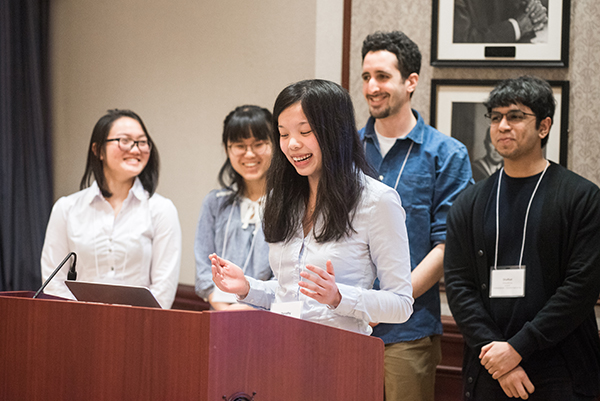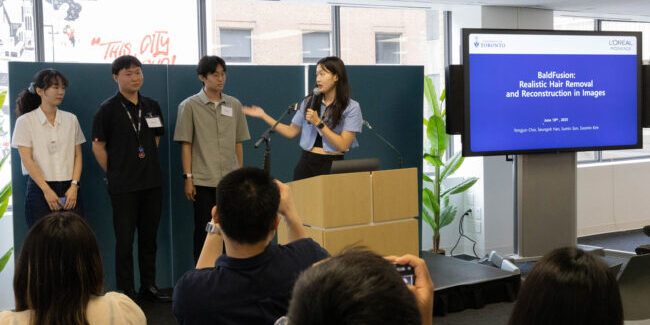U of T Engineering students presented innovative solutions to a wide range of social issues at the final showcase of The Game, hosted on March 16. The social innovation competition organized by U of T Engineering’s Institute for Leadership Education in Engineering (ILead) featured student proposals for increasing bicycle usage in Toronto, leveraging data to improve energy efficiency and ensuring access to mental health resources and many other creative approaches.
“Social innovation problems are complex and nuanced, so it was illuminating to go through the process of trying to find a solution,” says Rami Saab (IBBME MASc candidate). Saab’s team took the top prize of $5,000 for their approach to raising the proportion of Toronto commuters who bike to work from its current level of less than two per cent.
The annual competition, now in its third year, challenged teams to address a single question: How do I work with myself and others using effective tools and frameworks to create meaningful change?
“The goal of the program is not necessarily for students to get a definitive answer to that question, but for them to go through the process of exploring what the answer might look like to them,” says Albert Huynh (ChemE 1T2 + PEY, MASc candidate), an Engineering Leadership Education Specialist with ILead who led The Game this year.
In their research, Saab and his teammates, Shafkat Choudhury (Year 1 ChemE), Dorothy Liu (Year 1 CivE), Sunny Wang (Year 3 EngSci) and Iris Yu (Year 3 MSE), found that safety concerns were a significant deterrent for potential cycle-commuters — specifically, respondents were worried about being hit by opening car doors, called ‘dooring.’ To address this, the team reached out to the Ontario Ministry of Transportation (MTO) about the possibility of including dooring mitigation elements in both their Official MTO Driver’s Handbook and the road test.
“I really wanted to focus on transportation because that’s my major, and I’m working in transportation services,” says Wang, who is currently on a PEY internship with the City of Toronto. “I mainly do quantitative work, like data analysis, so [The Game] really makes the story complete.”
The second-place $2,000 prize was awarded to at team that built an app that renders household electricity usage data from hydro utilities in easy-to-read graphs, helping homeowners understand and improve their energy efficiency. The third-place team proposed enhancing the awareness and accessibility of mental health resources on campus by embedding educational elements within the first-year Engineering curriculum. Other topics ranged from connecting low-income youth to education and resources, to increasing the profile of social issues through art.
This year, Huynh and his colleagues encouraged the students to embrace an ideology of failing forward. “We found that in the first two years there was a lot of hesitation, almost analysis paralysis,” he explains. “But failure is essential because it’s inevitable. Acknowledging that it’s part of the process, developing that resilience and learning from those failures are critical to engineering and social innovation.”
Huynh says students were encouraged to risk failure by experimenting and testing their hypotheses, as well as going out and engaging with the broader community.
“Through talking to stakeholders, we learned that engineering is more than just the technical side, but it’s also interacting with other people,” says May Lai (Year 1 CivE) whose team addressed access to education and resources for youth from low-income families. “We learned to understand what our client really needs, and how to be a good engineer.”




